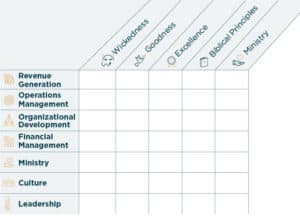What If Jesus Conducted an Audit of Your Business?
A Functional Worldview in Business Stewardship
By Mike Sharrow
What does it mean to be a Christ-following entrepreneur, investor, or “steward” in business?
It’s so easy to settle for an ethic of “don’t do bad things” and some token expression of generosity. Does the laissez-faire behavioral ethics of “do no harm” constitute a fair test? Is “tipping Jesus” with a percentage of economic proceeds good enough? We can dangerously accept an ends-justify-the-means mindset, where as long as I “don’t do bad things” and “give some of the gains”, somehow those together will baptize the messy means of “how.”
The bibllical narrative makes it clear that the “how” matters. Uzziah was killed for an irreverent act (2 Sam 6:7). Peter is chastised by Jesus for amputating Malchus’ ear (John 18:10). King Ahaziah is critiqued for being implicit in the ongoing idolatry and injustice during his reign (1 Kings 1).
Perhaps an exercise in the form of a fabled case study where you enter the story might help.
An Unplanned Owner Site Visit
Imagine arriving at work tomorrow, parking your car in the usual place, and walking toward the entrance. Everything seems normal. As you near the door, you notice a figure waiting just outside. As you approach, you sense a warm and open demeanor and reception. This person is obviously a friend.

You walk a few more steps, and you recognize Him. It’s Jesus!
He says, “I’d like you to show me around and explain the business to me. This is as much mine as any church is, so I’m curious to see what you’re doing with the business I entrusted to you to manage for Me.” In your mind’s eye, imagine yourself saying, “Well, fine, Lord, let’s go in.” Gulp.
Imagine taking Jesus through the reception area and into the main office then into your personal office, through the work areas, and around the entire physical location—of course, the showroom. Imagine Him keenly observing how you and your team interact as you take the tour.
Think about explaining how and why everything is laid out. Mentally introduce Him to each person, while explaining their function(s) and a little about them.
Sit down with Him in your office or conference room, and describe how each piece of the business functions–from the different ways of contacting customers, to the production and delivery of the product or service, to billing clients, and collecting payment. Jesus seems keenly interested in the business model, asking about the supply chain, vendors, procurement process—even pricing and marketing paradigms!
Tell Him how people are hired, trained, evaluated, encouraged, equipped, challenged, compensated, promoted, and disciplined. Explain how you handle customer, supplier, and employee complaints and suggestions.
Take Him through finance and accounting, showing Him how you pay bills and handle taxes. Discuss how you use or distribute profits and who benefits from them. Show Him the company’s debt, and explain how and why the leveraging works.
As you engage in each of these areas, imagine saying to Jesus, “Lord, this is how we try to show Your principles in this function or action . . . This is how we think You would do this . . . Lord, we do this so we won’t bring offense to Your name . . . Jesus, we don’t do this the world’s way because of what You said in Your Word.”
Does this process excite and encourage you? Or does it cause you to break out in a cold sweat? Is there a process, business practice, or person that you’d want to avoid in this tour?
God’s Plan for Our Businesses
In reality, this describes a typical CEO visit to a branch or subsidiary operation with an inspection tour guided by the local management team. During any such tour, we would demonstrate and discuss the major priorities, emphases, and progress against strategic plans.
The visiting owner or fund manager verifies that the venture consistently and successfully applies the basic plans for business development and growth. Results, in both near-term performance and overall business approach, are acutely evaluated for alignment, commitment to company goals and principles, and evidence of capable processes. The visiting owner wants to be sure the subsidiary is diligently following the corporate strategy and driving toward desired results.

In our ventures and investments, God conducts this review continuously. God does have a plan for our lives, and it includes every aspect: home, work, community, social, recreation, and any other area you might identify. You could say there is a performance review for stewards, but it’s an open-Book test!
Further, His plan always desires the same end. He wants us to consistently reflect His values— demonstrating the rule and reign of Jesus Christ in this world, making the glory of God manifest.
While the environments or playing fields may change, His eternal purpose never changes. He wants us to manifest the gospel of Jesus Christ. His ultimate purpose–to bring forward the Kingdom–drives everything He does and allows. Nothing in God’s world just happens.
In our businesses and investments, as in every other area of our lives, we can either recognize this reality or miss it completely. The choice is ours.

If we see our businesses and portfolios primarily as tools to produce money for ourselves, we’ll primarily concern ourselves with how well they generate cash. We’ll focus our attention, develop strategy, deploy people and assets, make decisions, and drive actions primarily toward that end.
On the other hand, if we see our business and investments as a part of God’s eternal plan, we believe they are entrusted to us and designed to fit into the intricate and beautiful future He is bringing into existence. Our business ventures strategically contribute to demonstrating the Kingdom of God on earth. In this case, our decisions and evaluations reflect different values, and we attempt to structure what we do to produce a godlier set of results.
A Biblical Worldview Fuels Redemptive Capitalism
Our Father’s agenda is to demonstrate and advance His Kingdom—complete with its economic, public health, foreign relations, and infrastructure policies. Whether financially fueling or vocationally investing in a venture, a series of progressive Biblical worldview prompts can spark a renaissance in our thinking about redemptive capitalism.
If the Jesus audit of your business or your portfolio had you wincing about departments, processes, holdings, and interests, here’s how you can study for the test in advance.
Consider this progressive series of “audit” questions applied against a balanced scorecard rubric as means to evaluate our functional worldview in enterprise stewardship.
Where is there wickedness, evil, corruption, or overt practices opposed to the Gospel in this area of the business, this company, this sector, or this industry?
There’s no “pass” if corrupt business practices are institutionalized or an industry norm. There are “high places” in every era, culture, and industry. The Bible mandates God’s people stand for justice and calls us to tear evil practices down—or certainly not perpetuate them. God cares how money is made and how the process affects people more than the money generated!
Examples: A consumer product company uses sexualized ads or marketing campaigns championing ideals harmful to human flourishing. A product company is known to draw upon abusive labor suppliers in foreign markets. A financial institution profits from excessive debt programs for vulnerable consumers creating economic oppression. A web hosting company supports pornographic and adult entertainment clients for high margins and enables social evils. A large company uses its clout to promote policies and practices contrary to God’s standards for human flourishing. A construction company pays bribes to gain government contracts.
How is goodness, virtue, restoration, and human flourishing being advanced?
Does this dimension of the business, particular ticker symbol, or fund represent opportunities to champion wholeness, decency, human dignity, and integrity?
Examples: A manufacturer commits to fair wages and sourcing materials from virtuous supply-chain partners. An insurance brokerage champions transparency of fees, foregoes kickbacks, and innovates sustainable cost models for the industry. A mortgage lender commits to due diligence in underwriting, financial literacy, and home ownership for vulnerable populations.
Is this area marked by excellence?
If Paul exhorts us to do “all things to the glory of God” and “as unto Christ,” surely that means a correct understanding of grace raises the bar of our desire for excellence. There is no excuse for mediocrity. Is there inferior, substandard mediocrity in the business? Or does the business exhibit exemplary quality?
Examples: A consumer product company uses exceptional warranty and quality standards on products. A technology company deliberately restrains growth forecasts to ensure employee wellbeing, quality control, and the ability to deliver on future commitments. Customer loyalty/satisfaction (e.g., Net Promoter Score or NPS), employee engagement, and other market indicators of quality for internal and external experiences are industry-leading.
Does the business embody Biblical principles? Do the “not-of-this-world” attributes of a Kingdom operating system ring true?
There is what is legal, what is conventional, and even what is best practice. But then there is “what would Jesus do” – a literal razor. This includes things like championing reconciliation to avoid destructive litigation (1 Corinthians 6: 1-11) or uncommonly caring for the immigrant, orphan, and vulnerable. Is this a “decent” venture or a Kingdom-class operation?
Examples: A construction company refuses to participate in predatory employment of vulnerable labor populations, insisting on fair wages and seeking to be a champion of justice. Employees are incentivized and rewarded for performance with high-integrity compensation systems. Mediation, Biblically-based reconciliation protocols, and pursuit of restorative resolution over destructive litigation remedies are institutionalized.
Are opportunities seized to leverage influence and resources to minister to people in the name and agenda of Jesus?
When we operate in a Business-as-a-Ministry mindset, we share the Good News of Jesus and express the love of Christ to those in need.
Examples: A company like COKE (NASDAQ) provides chaplaincy across 115 locations for employees, poverty simulators, and empathy programs to promote compassion for single parents and economically vulnerable team members. A financial services firm is known for genuine generosity towards human flourishing causes in their community and world. Intentional markers of loving people and communicating the truth of the Gospel in Jesus’ name are evident.
Use this chart to do a Biblical ownership audit for your business. For each area of the business, rate its alignment with biblical values on a 1-3 scale.
1 = not at all aligned with Biblical values
2 = somewhat aligned with Biblical values
3 = completely aligned with Biblical values.

Will every business, department, mutual fund, ticker symbol, or investment score perfectly through such an exercise? No! But facts are our friends and self-reflection will lead to growth.
The Baldrige Award initiative spurred industrial innovation and management quality for the US marketplace in the late 20 Century.
Perhaps simulations of this kind can help the Christian entrepreneur, executive, investor, or fund manager not just avoid doing bad stuff but also embrace redemptive capitalism with a Gospel-motivated zeal!
So What?
This model can become a lens through which to evaluate whether every aspect of your company demonstrates Jesus as the true Owner. We truly have been given the opportunity to either shine or betray our true purpose.
- What if Jesus was waiting for you at the company entrance tomorrow for His tour?
- If Jesus asks to review your portfolio of investments not just for ROI and IRR but also for Kingdom ROI (kROI) and Kingdom Rates of Return (KRR) as part of the stewardship calculus, are you ready?
- Do you have thoughtful answers to His questions concerning His primary interests?
- Do you have a plan centered on His values and purposes to guide you as you evaluate and develop each part of the business?
God has entrusted us with incredible platforms of leadership and capital. What opportunities will you seize? What do you need to prayerfully change to reflect the true Owner of your assets?
Maybe you, like Joshua (Joshua 24:15), will be able to state before culturally compromising peers, “You can blindly do what everyone else does for near-term pleasure, but as for me and my [investments…assets…capital…and stewardship], I will honor the Living God!”
At C12, we provide Christian business leaders, CEOs, and business owners with the business tools, peer advisory groups, and executive coaching they need to thrive in business and life. To learn more about C12’s approach to Christ-centered business leadership, find a C12 Business Forum near you.
December 5, 2022










